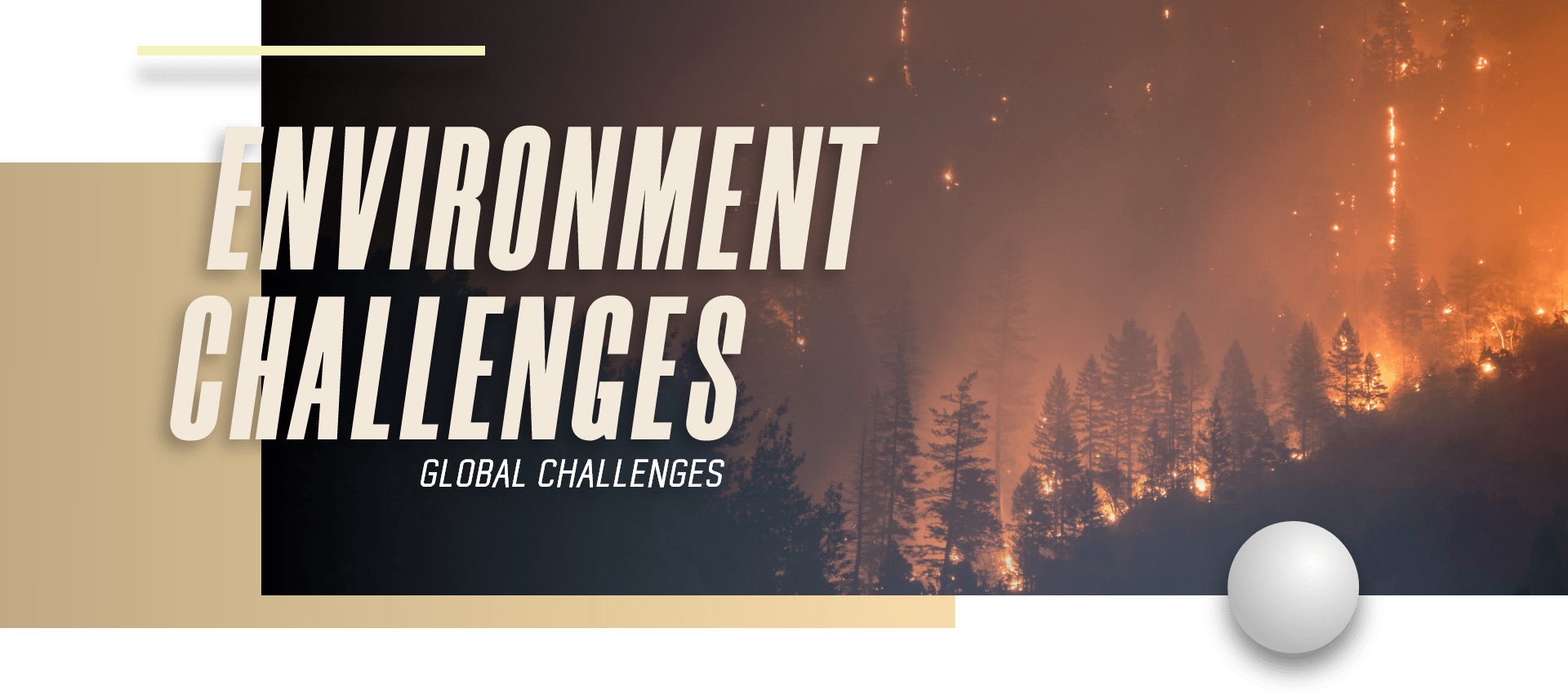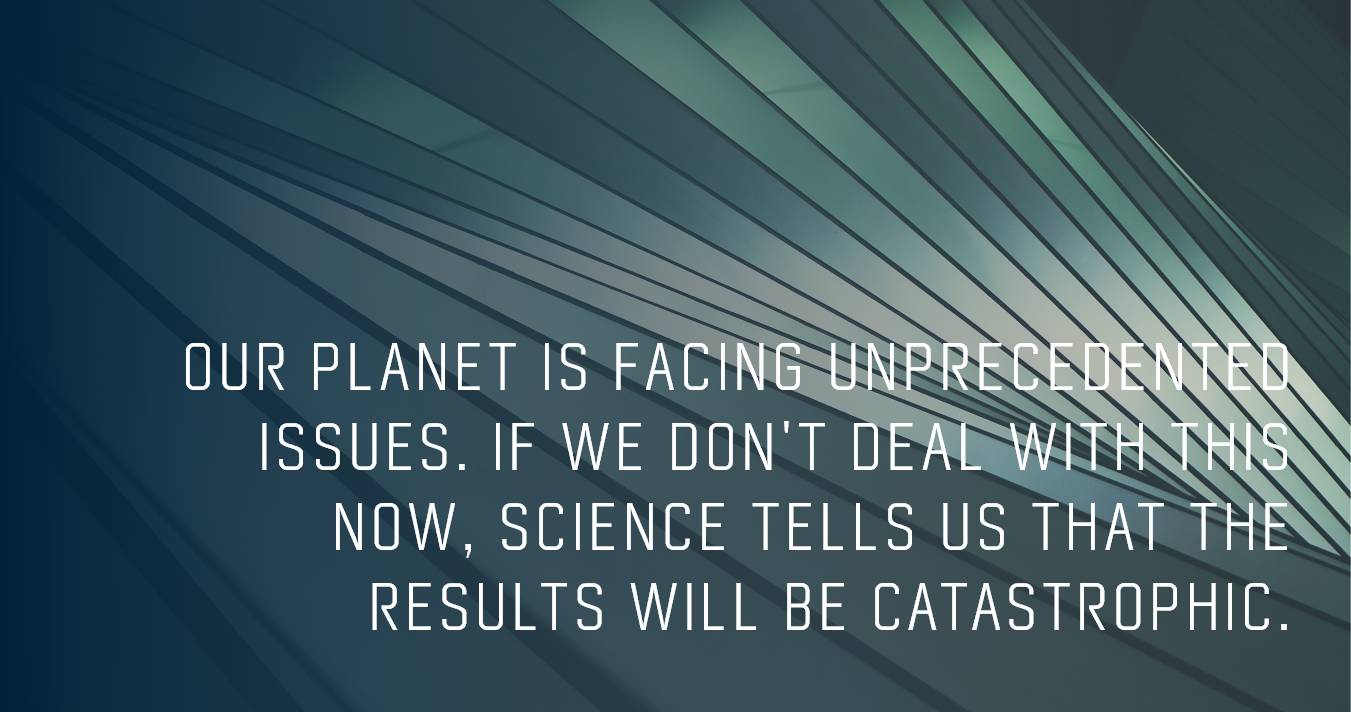Earth is currently facing lot of environmental concerns. Over the last few decades, the exploitation of our planet and degradation of our environment have gone up at an alarming rate. As our actions have been not in favor of protecting this planet, we have seen natural disasters striking us more often in the form of flash floods, tsunamis and cyclones.


Around the world, institutions and groups tray to spread the message and educating people as to how their small actions when combined together can play a big role in in protecting this planet. Looking at the environment around us we all can see that there are a number of issues that come to our attention.

TO FULLY UNDERSTAND CLIMATE CHANGE THE BEST THING ONE CAN DO IS SPENDING A DAY IN THE WILDS ALONE AND THEN IMAGINE THAT THE WOODS SUDDENLY DISAPPEAR.
WE MUST IDENTIFY WAYS OF LIVING, MOVING AND CONSUMING THAT HELP US RESTORE ENVIRONMENTAL BALANCE AND PROMOTE GLOBAL HEALTH.

The social impact caused by the relationship between climate change and poverty is now clear. Climate change exacerbates inequalities, not only in poor, developing countries, but also in industrialized, wealthy ones.
There are many types of inequalities to consider. First of all we have inequalities based on demographic characteristics, such as gender, race, ethnicity, religion and age.
A second type of inequality is regarding assets and income.
And then a third type is about public decision making and access to public resources, such as publicly financed health, education, housing, financing, and other services.
Needless to say, these different types of inequalities are interrelated. So we identified three main issues that encompass all the major global problems.
ENVIRONMENT
The Urgent Challenge
EQUALITY
The Compelling Challenge
EDUCATION
The Continuous Challenge
Climate change, deforestation, plastics and more are all threats to our future. Unless we let things get worse, we have to face these problems now. The environment is more than a goal, it is a battle that will require a commitment from everyone on this planet.
Widening disparities in pay, gender, health and job is undermining trust in democracy. Adding to this the pressure exerted on the middle class, in particular the younger generations, with stagnant wages and inaccessible house prices, finding a keystone is critical.
Education is the basis for building valuable human capital. But several causes, such as rapid technological changes, inequality in opportunities, the financial burdens of universities and more, have thrown the education system into a profound crisis.




According to researches on future scenarios, the environmental ecosystem will undergo significant changes. Climate change is actually only one of the causes that will lead to such effects, such as natural environments, plants and animals.
A direct consequence will be the acceleration of biodiversity loss in some areas. This impact will affect many communities and sectors that depend on natural resources, including agriculture, fishing, energy, tourism and water.
PLASTIC POLLUTION
EMISSIONS REDUCTION
DANGEROUS DEFORESTATION
Plastic pollution has become one of the most pressing environmental problems. The cause is due to the fact that the production of disposable plastic products is incessant and the institutions and governments of the world are unable to adequately address them.
Carbon emissions concerns people everywhere, even those in undeveloped countries. But when it comes about to rank global issues carbon emission results last, way below security, food, education, health and energy and transport related issues.
Forests cover 30% of the Earth’s land surface, Forested areas can provide food, medicine and fuel for more than a billion people. Most deforestation is happening in the tropics once inaccessible and now within reach as new roads are constructed through the forests.
BIODIVERSITY LOSS
WATER SCARCITY
WASTE DISPOSAL
Biological diversity is the resource upon nations and future generations depend. Drastically reduced biodiversity leads to scarce or irregular fresh water reserves and food supplies more vulnerable to pests and diseases and potentially reduced for millions of people.
1.1 billion people worldwide lack access to water. A total of 2.7 billion find water scarce for at least one month of the year. At the current consumption rate by 2025, 2/3 of the world’s population may face water shortages. And other ecosystems will suffer even more.
Disposal processes can cause other damage, such as the generation of methane gas, which is explosive and contributes to the greenhouse effect. Plastic incineration produces toxic substances. Incineration gases can cause air pollution and contribute to acid rain.
RENEWABLE ENERGY
GLOBAL WARMING
MEDICAL WASTE
Consistently high power quality is required to ensure network stability and high efficiency. However, most renewable energy sources depend on natural resources, such as sun, wind, and ocean waves, which are all uncontrollable by man.
Earth’s rising temperatures are fueling longer and warmer heat waves, more frequent droughts, more intense rains and more powerful hurricanes. Earth’s ocean temperatures are also warming up, which means that tropical storms can gather more energy.
Medical waste is posing a growing problem worldwide, jeopardizing the health of staff, patients, disposal workers and anyone else coming into contact with the often hazardous materials discarded by hospitals and other health-care sites.
NATURAL DISASTERS
NATURAL RESOURCE DEPLETION
ACID RAIN
The damage caused by disasters is immeasurable and is associated with a high degree of psychological disturbance. Families affected by natural disasters find themselves lost, homeless and in a situation aggravated by the lack of food and drinking water.
The growing depletion of natural resources goes hand in hand with the growing increase in the global population. According to estimates, the world’s ecological footprint is one and a half times the earth’s ability to provide humans with resources to meet their consumption levels.
Although natural disasters also generate acid rain, most pollutants are of human origin. Two thirds of sulfur dioxide and one quarter of nitrogen oxide in the atmosphere come from fossil fuel power plants, electricity generators, vehicles and oil refineries.
OZONE LAYER DEPLETION
GENETIC MODIFICATION
MINING HARMFUL CHEMICALS
Human activity has damaged this protective layer of the stratosphere. Ozone layer damage is more like a thin patch than a hole. Exposure to UVB radiation is linked with increased risk of skin cancer and cataracts, as well as damage to plants and marine ecosystems.
When It Comes About Food, Genetic Modification Utilizing Biotechnology Can Be Harmful Bringing Expanded Poisons And Sicknesses. Some crops can represent a massive threat to the ecosystem as animals start to ingest the unnatural chemicals.
The effect of a hazardous chemical depend on its toxicity and the extent and duration of the exposure. Toxic emissions from the earth’s depths can cause pollution of any kind to air, water and soil pollution. But also cause human damage such as pain, injury and serious illness.
AIR POLLUTION
WATER POLLUTION
SOIL AND LAND POLLUTION
Pollution take a huge number of years to recover. Air pollution is caused by the gases and poisons discharged from the production plants and the burning of fossils and makes it difficult for plants, animals, and humans to survive as the air becomes dirty.
Clean drinking water is becoming rare. Contaminated water kills more people every year than war and all other forms of violence put together. This also affects marine life. Rivers, reservoirs, lakes and seas are drowning in chemicals, waste, plastics and other pollutants.
Activities like mining, littering, deforestation, industrial, construction and agricultural activities lessens the quality and productivity of the land. Unlike water where we can clearly see the effects of pollution, the earth is also abused but we are unable to calculate the growing damage.
EXPLORE MORE
Sonder Industries members use their skills and competences to find solutions to the great social challenges of our time. We bring together thinkers, innovators and anyone who is willing to use their resources to solve some of the most pressing global problems.

